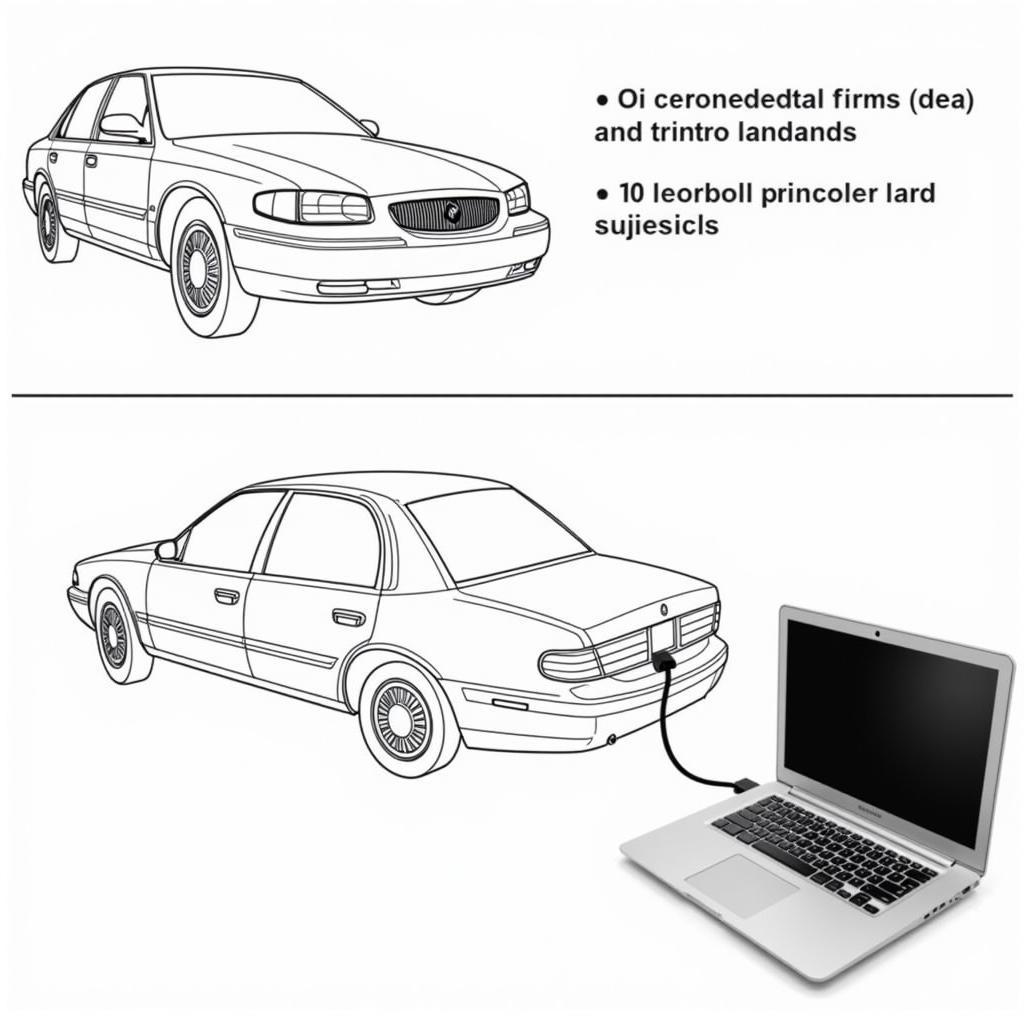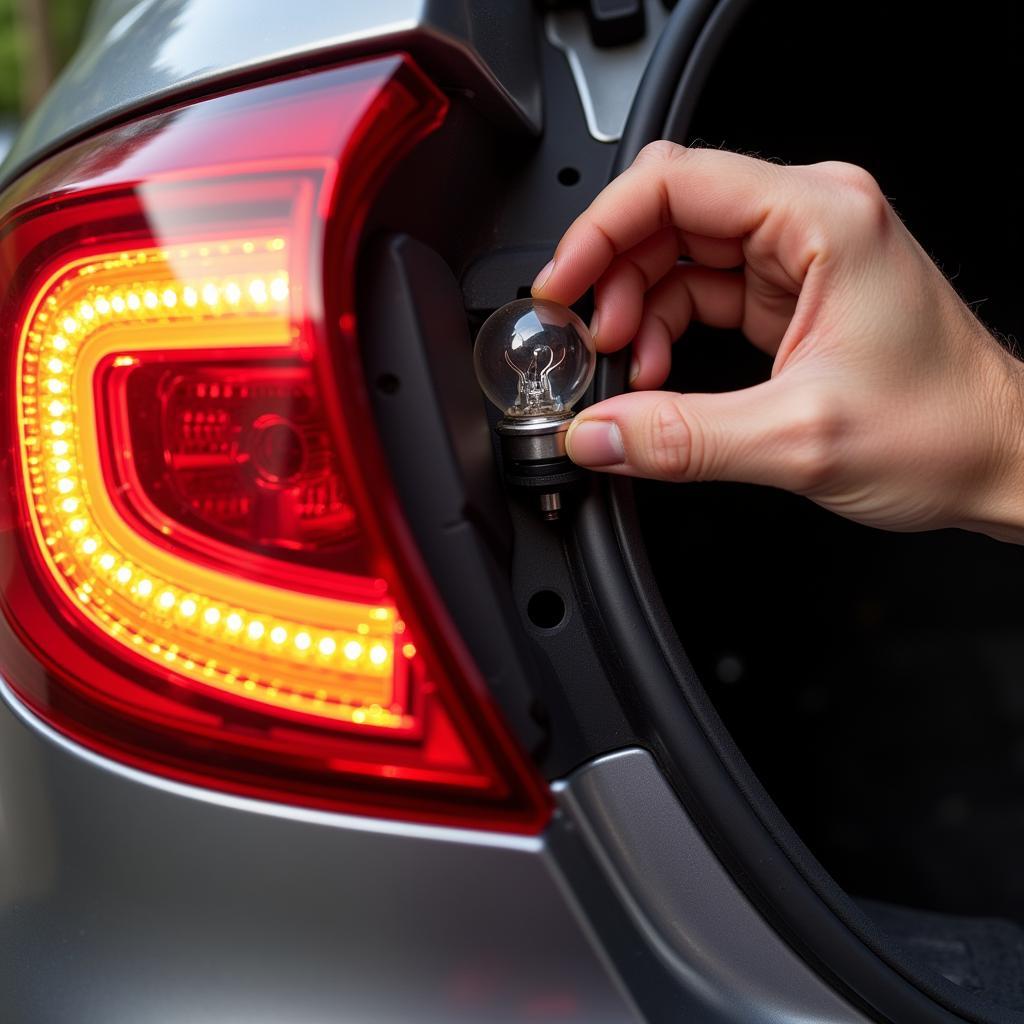The 2003 Buick Century brake warning light can illuminate for several reasons, ranging from low brake fluid to more serious issues like a failing ABS system. Understanding what triggers this light and how to address it is crucial for maintaining your vehicle’s safety and performance. This comprehensive guide will help you diagnose and troubleshoot the brake warning light in your 2003 Buick Century.
Understanding the Brake Warning Light
The brake warning light is part of your Buick Century’s safety system. It’s designed to alert you to potential problems with your braking system. When this light comes on, it’s essential to take action promptly. Ignoring it can lead to dangerous driving conditions and costly repairs. Remember, this light can also indicate issues with the parking brake.
Common Causes of the Brake Warning Light in a 2003 Buick Century
Several factors can cause the brake warning light to illuminate. Here are some of the most common culprits:
- Low Brake Fluid: This is the most frequent cause. Brake fluid levels naturally decrease over time due to wear and tear. A leak in the brake lines or a worn-out master cylinder can also lead to low fluid levels.
- Worn Brake Pads: As your brake pads wear down, they reach a point where they need replacing. The brake warning light often signals this.
- Faulty Brake Sensor: Your Buick Century has sensors that monitor the brake system. A malfunctioning sensor can trigger the warning light even if there’s no actual problem with the brakes.
- ABS Issues: The Anti-lock Braking System (ABS) is a critical safety feature. If there’s a problem with the ABS, the warning light might come on. This could be due to a faulty sensor, pump, or control module.
- Parking Brake Engaged: Sometimes, the simplest explanation is the correct one. Ensure the parking brake is fully released.
Diagnosing the Problem
Before you panic, take a deep breath and follow these steps to pinpoint the issue:
- Check the Parking Brake: Make sure the parking brake is fully disengaged. This might seem obvious, but it’s a common oversight.
- Inspect the Brake Fluid Level: Locate the brake fluid reservoir under the hood. If the fluid is below the “MIN” line, add brake fluid of the correct type (consult your owner’s manual).
- Check the Brake Pads: Visually inspect the brake pads through the wheel spokes. If they appear thin or worn, it’s time for a replacement.
When to Seek Professional Help
If you’ve checked the basics and the brake warning light remains on, it’s time to consult a qualified mechanic. Issues with the ABS system or other complex brake components require specialized diagnostic equipment and expertise.
“Ignoring a persistent brake warning light can be extremely dangerous,” says John Smith, ASE Certified Master Technician. “It’s always best to err on the side of caution and have a professional inspect your braking system.”
Remote Diagnostics and Programming
Modern technology allows for remote diagnostics and programming, offering convenient solutions for certain brake-related issues. If the problem lies within the vehicle’s electronic control modules, remote software updates and calibrations can sometimes resolve the issue without a physical visit to the mechanic.
 Remote diagnostics being performed on a 2003 Buick Century
Remote diagnostics being performed on a 2003 Buick Century
Conclusion
The 2003 Buick Century brake warning light is a crucial safety indicator. Addressing the underlying problem promptly is vital for safe driving. By following the troubleshooting steps outlined above, you can often identify and resolve simple issues yourself. However, for more complex problems, seeking professional assistance is always recommended. Don’t ignore your 2003 Buick Century brake warning light – your safety depends on it!
“Regular brake maintenance, including fluid checks and pad replacements, can prevent many brake-related issues and keep your 2003 Buick Century running smoothly,” adds Jane Doe, Certified Automotive Technician.
FAQ
- What type of brake fluid should I use in my 2003 Buick Century? Consult your owner’s manual for the recommended brake fluid type.
- How often should I check my brake fluid level? It’s good practice to check your brake fluid level at least once a month.
- How long do brake pads typically last? Brake pad lifespan varies depending on driving habits and conditions, but typically ranges from 25,000 to 70,000 miles.
- Can I drive my car with the brake warning light on? While you might be able to drive a short distance, it’s highly discouraged. Driving with a brake warning light on can be dangerous.
- What is the cost of replacing brake pads on a 2003 Buick Century? The cost varies depending on location and the type of brake pads used.
- Is it safe to add brake fluid myself? Yes, as long as you use the correct type of brake fluid and follow the instructions in your owner’s manual.
- How can I find a qualified mechanic to inspect my brakes? Check online reviews and ask for recommendations from friends and family.

